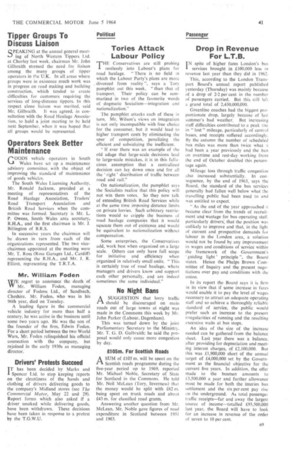Drop in Revenue For L.T.B.
Page 43

If you've noticed an error in this article please click here to report it so we can fix it.
IN spite of higher fares London's bus services brought in £100,000 less in revenue last year than they did in 1962. This, according to the London Transport Board's annual report published yesterday (Thursday) was mainly because of a drop of 2.2 per cent in the number of passengers carried. But this still left a grand total of 2,430,000,000. Greenline coaches had the biggest proportionate drop, largely because of last summer's bad weather. But increasing staff difficulties contributed to a peak rise in "lost" mileage, particularly of central buses, and receipts suffered accordingly. By the autumn the number of scheduled bus miles was more than twice what a had been a year previously and the ban on overtime and rest-day working from the end of October doubled this percentage again. Mileage loss through traffic congestion also increased substantially. In consequence, by the end of 1963, says the Board, the standard of the bus services generally had fallen well below what the travelling public had been used to and was entitled to expect. " As the end of the year approached it became clear from the trends of recruitment and wastage for bus operating stall. particularly drivers that the position was unlikely to improve and that, in the light of current and prospective demands for labour in the London area, a solution would not be found by any improvement in wages and conditions of service within the framework of the Government's ' guiding light' principle ", the Board states. Hence the Phelps Brown Committee of Inquiry and the present negotiations over pay and conditions with the union.
In its report the Board says it is firm in its view that if some increase in fares would enable it to pay the level of wages necessary to attract an adequate operating staff and so achieve a thoroughly reliable standard of Service, the public would prefer such an increase to the present irregularities of running and the resulting excessive waits at bus stops. An idea of the size of the increase needed can be gathered from the balance sheet. Last year there was a balance, after providing for depreciation and meeting interest charges, of £2,100,000. But this was £1,900,000 short of the annual target of £4,000,000 set by the Government as the financial objective for the current five years. In addition, the offer made to the busmen amounts to £3,500,000 a year and further allowance must be made for both the interim bus settlement and the six per cent pay rise on the underground. As total passenger traffic receipts—far and away the largest source of income—totalled £93,500,000 last year, the Board will have to look for an increase in revenue of the order of seven to 10 per cent.












































































































































































